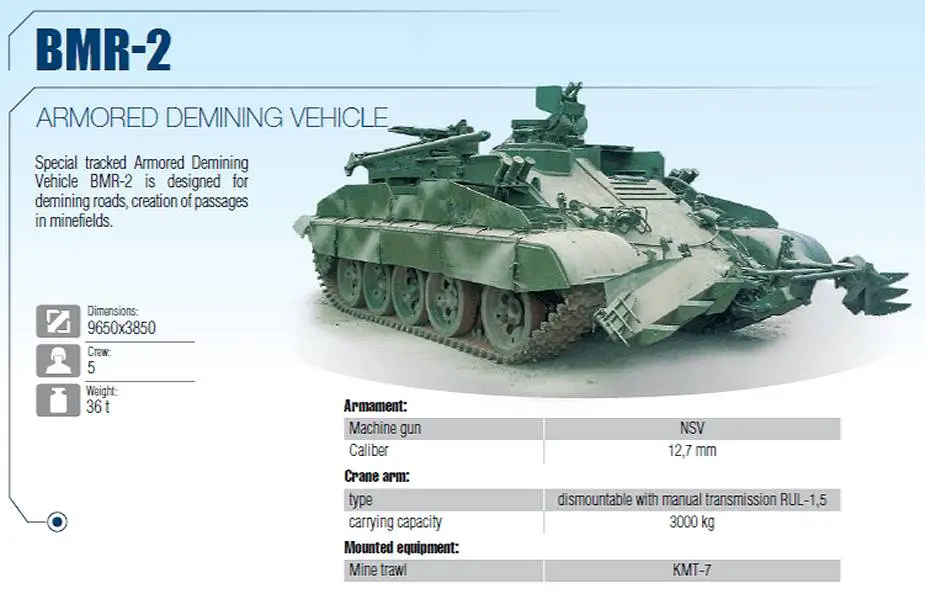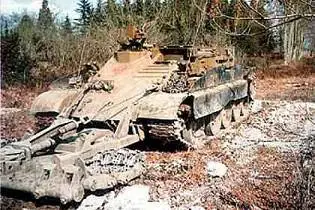- Army
- Air Defense Systems
- Anti-tank systems and vehicles
- Armored Vehicles
- Armoured personnel carriers
- Artillery Vehicles and Weapons
- Command Post
- Communication Vehicles and Systems
- Electronic Warfare
- Engineer | Maintenance Vehicles
- Infantry Fighting Vehicles
- Main Battle Tanks
- Missiles
- Tactical and Logistic Vehicles
- Radars
- Unmanned Systems
- Weapons
- Navy
- Air
BMR-2 mine clearing
BMR-2
Mine clearing demining tank armored vehicle - Russia

Description
The BMR-2 is a mine-clearing demining armored vehicle based on T-54B tracked tank chassis. The experience of conducting combat operations in Afghanistan highlighted the necessity of mine-clearing vehicles in armored and tank units. Thus, the Soviet Ministry of Defense issued a technical task for the development of such an engineering vehicle. The vehicle received the designation BRM (Armored Demining Vehicle). The first version, the BRM-1 was based on the self-propelled artillery mount SU-122-54 while the second was developed based on T-54B tracked tank chassis. The first prototype samples of the BMR-2 "Product 048" were assembled in 1985. In 1986, the BMR-2 was adopted and began to be mass-delivered to Russian military units deployed in Afghanistan.
BMR mine clearing tank variants:
- No variants at this time.
Technical Data
| Armament |
|
The BMR-2 is equipped with an enclosed anti-aircraft machine gun installation with an NSV 12.7mm heavy machine gun, mounted on the commander's turret located on the right side of the crew compartment roof. The machine gun installation is identical to that on the T-64A tank. The commander's turret is welded in the shape of a hexagon. The weapon station is fitted with a PZU-5 sight used to aim and fire the machine gun. Thus, the detection, tracking of targets, and firing were carried out by the commander under the protection of a closed hatch cover. The vehicle also has 8 grenade launchers of the 902A "Tucha" system, with a bank of four grenade launchers mounted on each side at the front of the crew compartment.
|
| Design and protection |
|
The BMR-2 is based on the Russian T-54B tracked tank chassis. The turret has been removed and replaced by an armored superstructure mounted in the center of the hull. The armor thickness at the front of the crew compartment is 60mm while the sides are 40mm thick and the roof is 20mm. The crew consists of 5 soldiers with the drive position at the front left side of the hull while the other four crew members including the commander and 3 sappers are located in the armored superstructure.
|
| Mobility |
| The BMR-2 is fitted with a V-55 V-12 water-cooled diesel engine, power transmission units, and running gear of the T-55 tank. The engine is coupled to a manual transmission with 5 forward and 1 reverse gears. The torsion bar suspension consists on each side of five single rubber-tired roadwheels with a distinct gap between the first and second roadwheels. The drive sprocket is at the rear and the idler at the front. There are no track-return rollers. The first and fifth roadwheel stations are provided with a hydraulic shock absorber. The tank can run at a maximum road speed of 50 km/h with a maximum cruising range of 460 km. |
| Combat Equipment |
| As a mine clearing vehicle, the BMR-2 is equipped with two KMT-7 "Parnas" track mine trawls with a "Payschik" electromagnetic attachment mounted on a special dismantling crane jib in front of the tank hull.
The KMT-7 is a Soviet-era mine-clearing device that is typically mounted on tanks. The main purpose of the device is to create a path through minefields that is safe for other vehicles to pass through. It is a roller system that uses large, cylindrical wheels that are weighted and designed to detonate pressure-sensitive mines ahead of the vehicle it is mounted on. When the rollers pass over a mine, the weight of the roller will trigger the explosive, thus clearing the path of mines. These mine-clearing devices are especially useful in military situations where a path through a minefield needs to be quickly cleared for advancing forces. However, they are only effective against pressure-sensitive mines and would not clear mines that are triggered in other ways, such as by tripwires or remote detonation. The tank also featured a cargo platform for transporting working trawl rollers and a crane jib for their loading/unloading. Pneumatic and electrical systems were installed for controlling the towed trawling equipment. Thanks to the trawls, the BRM-2 creates 2 safe tracks with a width of 800mm at a speed of up to 12 km/h. The installation of trawls takes up to 3.5 hours for the crew, while detachment and dismantling take about 20 minutes. |
Specifications
| Armament | Armor |
| One12;7mm heavy machine | Protection against firing of small arms and artillery shell splinters |
| Country users | Weight |
| Russia, Ukraine | 36,000 kg |
| Designer Country | Speed |
| Russia | 50 km/h |
| Combat Equipment | Range |
| Night vision system, NBC protection system, mine clearing tool KMT-7 | 460 km |
| Crew | Dimensions |
| 5 | Length: 9.65 m; Width: 3.85 m; Height: ? m |
Details View
 |
|
 |
 |
 |
 |
Pictures - Video

























